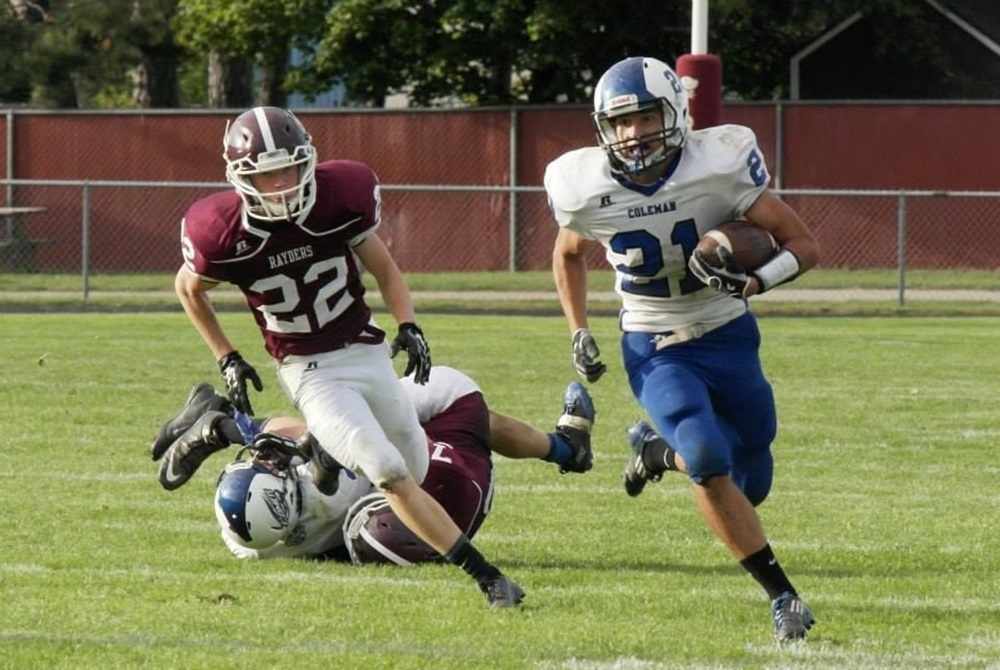
In the Long Run: Only 15 Rushers Share State Record with 99-Yard Scoring Sprint
By
Steve Vedder
Special for MHSAA.com
August 26, 2024
Jakob Price remembers the defense forcing him into a subtle change of plans at the line of scrimmage, then about a dozen seconds later finishing his run into the MHSAA record book.
It's a rare story that only 15 football players in MHSAA history can tell, most involving similar circumstances. A couple of key blocks, the opening of but a sliver of a hole, a fortuitous breakdown on defense including a broken tackle or two, capped, in many cases, by simple luck.
When it comes to a rusher busting loose on a 99-yard run, there is much that has to fall into place. In the case of Price, a sophomore at Muskegon when he became the last player to make that rare record-tying dash on Oct. 8, 2021, it was all the above.
"I remember we ran what we called a "power 6" and I hit the line hard," Price said. "I saw that the hole off the center was clogged, and I thought I was going to get hit, but I made a move. Three guys had a shot at me, but someone took out the tackle with a block and I saw nothing but green. It was almost a safety, but then this hole opened up and I was gone."
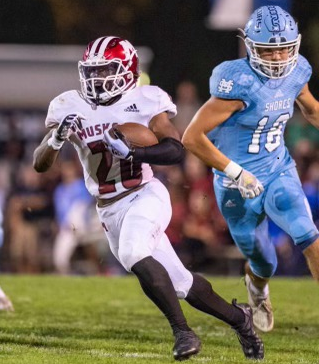 In comparison, for instance, there have been 81 players who've thrown for at least six touchdowns in a game. But only 15 players in Michigan history have snatched a handoff and sped 99 yards to pay dirt. It's a wide cast of characters that stretches from one player who has played in 12 major league baseball games to another who collected three times as many receiving yards as rushing and whose previous longest run had been a modest 25.
In comparison, for instance, there have been 81 players who've thrown for at least six touchdowns in a game. But only 15 players in Michigan history have snatched a handoff and sped 99 yards to pay dirt. It's a wide cast of characters that stretches from one player who has played in 12 major league baseball games to another who collected three times as many receiving yards as rushing and whose previous longest run had been a modest 25.
The first 99-yard run chronicled in the MHSAA record book was by James Edington of Morrice, who raced 99 yards against Kingston on Oct. 29, 1999. Edington's run was one of his last during an outstanding four-year career that included being named all-state three times. He remembers the play, which came late in a playoff game, being an inside trap where he broke at least two tackles. Edington said the play wasn't designed for anything more than to keep the defense from notching a safety.
"I was just trying to get out of the end zone, get us some room," said Edington, who remembers having 4.7 speed in the 40-yard dash. "I remember it was at the end of the game and I was so tired. I was a two-way player who rarely came off the field. I know that in a 99-yard run the blocks have got to be there when the defense hits the box. I knew if I could just get past this linebacker, there was a lot of green grass in front of me."
Morrice, coincidentally, also is the only program to have a 99-yard runner in 8-player football. Morrice switched from 11 to 8-player with the start of the 2014 season, and Jake Rivers made the 99-yard sprint twice in 2015.
Saugatuck coach Bill Dunn is the only coach to have two players on the list, including his son Blake, on Sept. 25, 2015, against Decatur.
From a coaching standpoint, Bill Dunn said there is nothing like a crushing 99-yard burst to change a game's momentum. When a team is clinging to the ball at its 1-yard line, the possible outcomes are seemingly dark – from surrendering a safety to a punt that puts the opposition in prime position to score.
"A lot of things have to happen in a 99-yard run," Dunn said. "There can absolutely be luck. And it can be a backbreaker. You got a team at the 1-yard line, and the defense knows it's going to get good field position with a punt. But instead you get a guy who breaks one for 99."
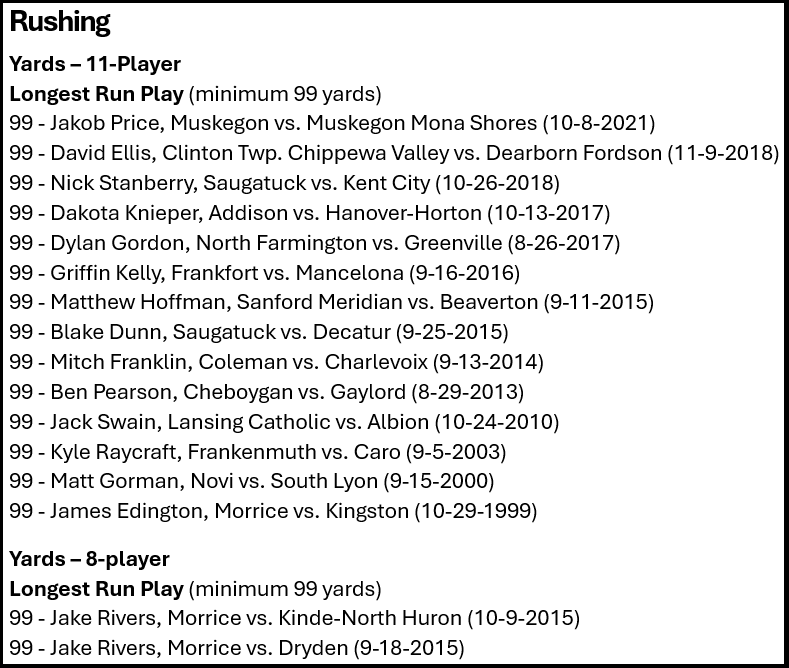 Blake Dunn, now a prospect in the Cincinnati Reds system, was an all-state sprinter in high school as part of earning 16 varsity letters across four sports. Dunn said he made a "mid-line read" after the fullback dove into the line. The defense collapsed on him, Dunn cut back against the grain and was off to the races.
Blake Dunn, now a prospect in the Cincinnati Reds system, was an all-state sprinter in high school as part of earning 16 varsity letters across four sports. Dunn said he made a "mid-line read" after the fullback dove into the line. The defense collapsed on him, Dunn cut back against the grain and was off to the races.
"Our fullback dove down the mid-line, and my read crashed down to him," said Dunn, whose 101 career touchdowns are fourth in state history while his 6,954 rushing yards rank eighth.
"When I followed my blocks through the hole, there was a bunch of open grass. I think there might have been a linebacker that almost tripped me up from the backside, but nobody was able to get me and then 99 yards later it ended in a touchdown. It was pretty cool fun in the moment and fun to look back on it now."
Kyle Raycraft of Frankenmuth made his 99-yard run against Caro on Sept. 5, 2003. Like many of his brethren’s stories, Raycraft, who remembers running for more than 200 yards and three or four touchdowns in the game, said the play came down to a couple of blocks, shaking off potential tacklers, and having daylight in front of him.
"I went up the middle and got good blocking at the line and broke a couple tackles," said Raycraft, also an all-state sprinter and currently an emergency room doctor in Sault Ste. Marie. "I really didn't think that much of it at the time. I think it got us the lead at a key time and that was exciting, but I didn't think it was so rare. There's been a lot of high school football and only (15) kids have done this, so that's a pretty short list."
Matthew Hoffman of Sanford Meridian, by his own admission, wasn't particularly fast. So speed played a minimal part in his run Sept. 11, 2015, against Beaverton.
Hoffman ran track in the spring, but not as a sprinter; he ran distances. His piece of football history was more a result of getting a couple of key blocks, breaking through the line, making a cut and finding running room along the sideline.
"I broke to the line and swerved to the left to the sidelines," said Hoffman, now a certified rescue boat operator working on the Gordie Howe International Bridge for the Bridging North America company. "I was quick and shifty and I'd get a few breakaways, but I wasn't fast. I think the defense was looking for me on the right side, and it was a counterplay to the left. The offensive line did a great job on that play.
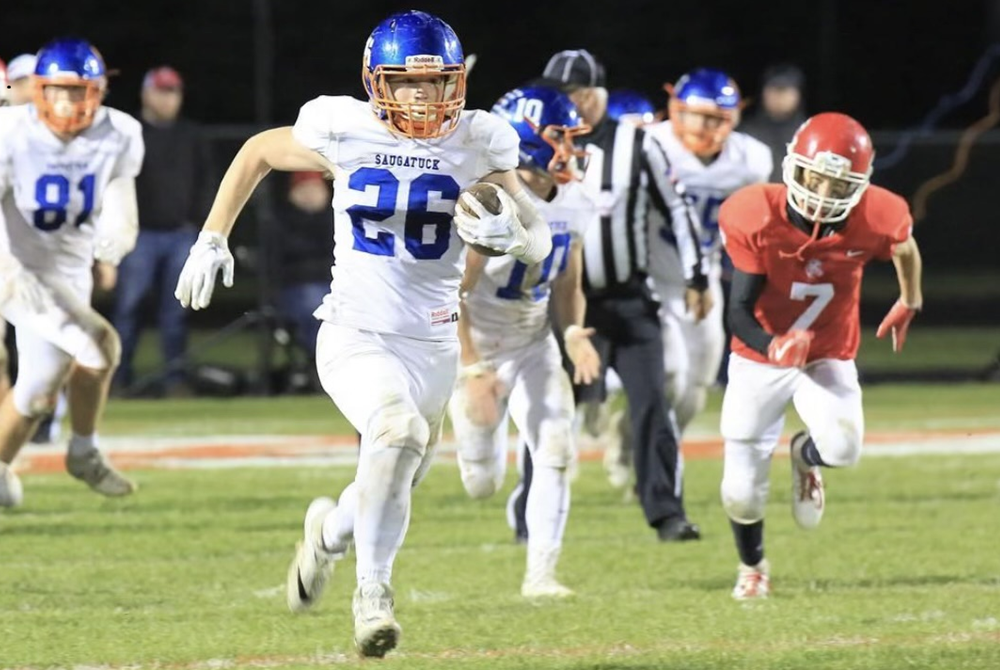 "It was exciting, but (instead of records) it was more it just happened so quickly. People met me in the end zone after the play was over, but then we were just focused on defense and the next play."
"It was exciting, but (instead of records) it was more it just happened so quickly. People met me in the end zone after the play was over, but then we were just focused on defense and the next play."
Coleman's Mitch Franklin has another different slant on his 99-yard story. He was primarily a receiver who recorded 1,014 yards at that position as opposed to around 300 as a running back. But on Sept. 13, 2014, against Charlevoix, Franklin took advantage of a rare handoff after a quarterback sneak had netted virtually no gain on first down.
"Best blocking we had all year. A hole opened up, I stiff-armed a guy and just ran," said Franklin, a former Gladwin County sheriff’s deputy. "I remember I was fortunate to run on our right side where we had bigger guys. It was fortunate that we caught the defense off guard. I think it was about our first power run that game and a lot of fortunate things had to happen.
"One of the things I remember is our principal patting me on the back and telling me what a good run it was."
While the members of the select 99-Yard Club may have different memories as to how they successfully dashed from their team's 1-yard line into the other team's end zone, their goals were the same: Just somehow move their team from the shadow of their own goalposts into more favorable territory.
And one last goal, recalled Franklin.
"Hey, you just don't want to make that long drive home with a big, fat ‘L,’” he said. "You want to win the game. That's what was important."
The MHSAA is continuously adding to its record books, and there is no deadline for an accomplishment to be submitted. Find directions to do so and the football record books in full at this link.
PHOTOS (Top) Coleman's Mitch Franklin (right) turns upfield during a 99-yard scoring run against Charlevoix on Sept. 13, 2014. (Middle) Muskegon's Jakob Price (left) makes a move on the way to a 99-yard touchdown run against Muskegon Mona Shores in 2021. (Below) Saugatuck's Nick Stanberry breaks away for a 99-yard TD run against Kent City in 2018. (Photos provided by Franklin, Price and the Saugatuck football program.)
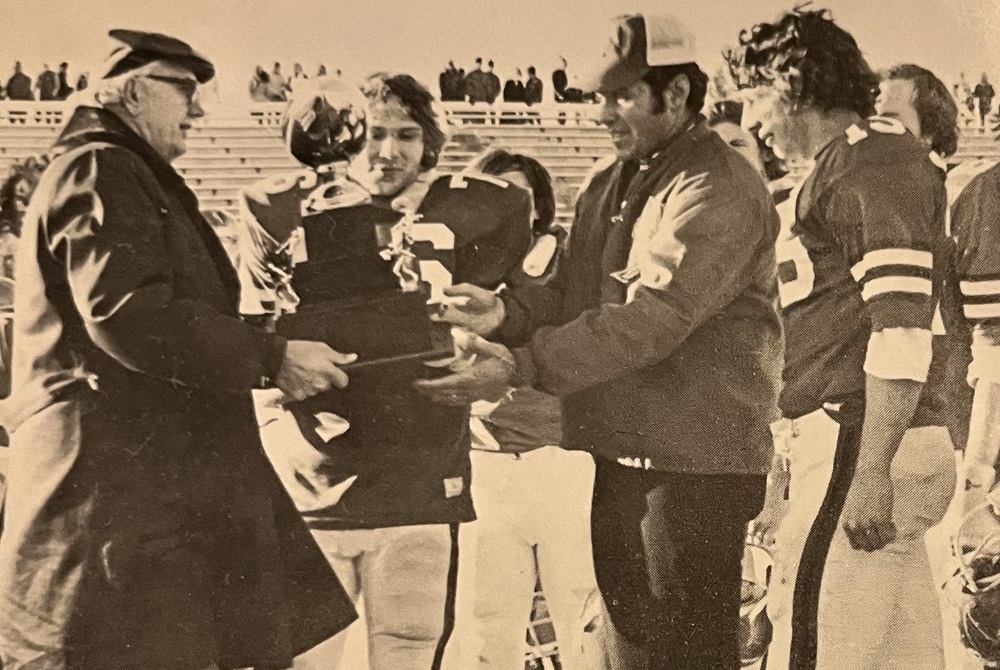
'Refuse to Lose' Divine Child Set Tone for Teams to Come with 1st Class B Title
By
Brad Emons
Special for MHSAA.com
November 15, 2024
There was no more conjecture, no newspaper or Associated Press polls to determine the state football champions.
The champion was no longer decided on paper, but out on the field as the MHSAA launched its first playoff tournament in 1975.
Only 16 total teams over four classes were invited to the dance.
And a school with an already a rich football heritage in Dearborn Divine Child proved it on the field with a 21-0 win over Saginaw MacArthur in the Class B title game before 4,000 fans at Central Michigan University’s Perry Shorts Stadium in Mount Pleasant.
In the Semifinals, MacArthur had outlasted Flint Ainsworth, 44-38, as senior halfback Mark Neiderquill rushed for 285 yards and four touchdowns, while Divine Child ousted Sturgis, 20-3.
In the frigid championship final on Nov. 22, the Falcons’ defense held MacArthur’s high-octane offense to seven first downs and 74 yards rushing. They caused three turnovers, with two fumble recoveries and an interception leading to all three of their TDs.
“I thought we could move the ball, but MacArthur was tough,” DC coach Bob LaPointe told the Detroit Free Press.
In the second quarter, Pat Doyle returned an interception 28 yards for a TD, and Mike Surmacz added the PAT for a 7-0 Divine Child advantage.
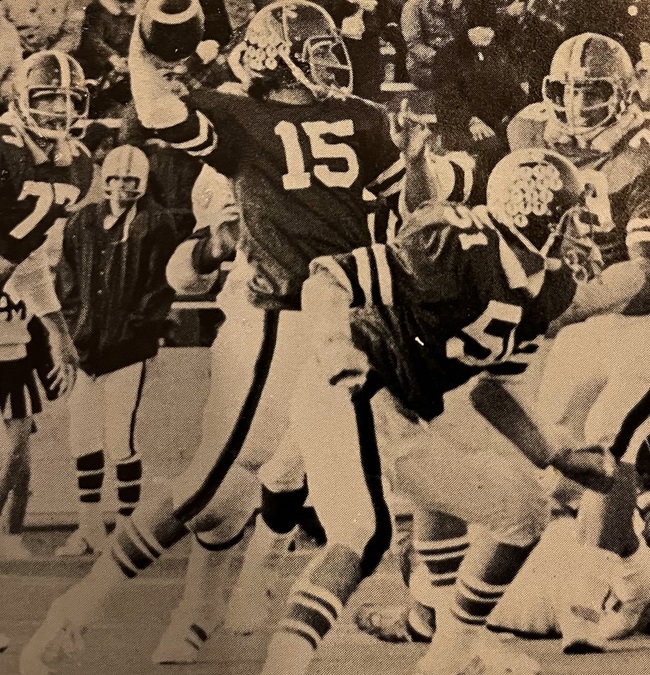 “That first interception really got us rolling,” LaPointe said. “Doyle can run the 40 in 4.9 and speed is what made that touchdown. But he got good blocking, too.”
“That first interception really got us rolling,” LaPointe said. “Doyle can run the 40 in 4.9 and speed is what made that touchdown. But he got good blocking, too.”
Two minutes later, Mike Wiacek gave DC another scoring opportunity when he recovered a MacArthur fumble at the Generals’ 24. Nine plays later, senior quarterback Dan Faletti swept right end and scored on a three-yard bootleg for a 14-0 lead.
“The big thing is that they had a good running back that we had to make sure we kept under control,” said Faletti, who went on to play at Eastern Michigan University before a neck injury prematurely ended his career as a sophomore. “We pretty much got the lead, and Bob was conservative. I just remember scoring that touchdown, and my picture made the paper the next day.”
Neither team could move the ball in the third quarter. There were no first downs.
All-stater Mike Svihra then picked up a fumbled lateral in the fourth quarter and ran 10 yards for the game’s final TD.
“It was not a lot of offense; it was a bitter, cold day,” said Faletti, who went on to work for the Department of Defense for 20 years and Ford Motor Co. before recently retiring. “Bob LaPointe ran a conservative offense. We did ball-control, we didn’t put tons of points on the board ... we didn’t fumble the ball. We didn’t throw interceptions.”
The game, ironically, was played on AstroTurf, not on real grass.
“Everyone makes a bit deal of it, but there really isn’t that much difference,” LaPointe added afterwards. “The only thing I regretted about this game was that I could dress only 44 of my 56 players under the rules. It was tough (to) tell the other 12 they couldn’t suit up.”
An 18-12 loss to Madison Heights Bishop Foley during the final regular-season game, spoiling what would have been an undefeated season in 1974, had left the Falcons distraught – but even more galvanized as they made preparations for the 1975 campaign.
The Falcons also changed their offense in 1975, switching to a triple-option attack that LaPointe got from Notre Dame. The offense proved to be good enough for a 9-0 regular season and an MHSAA playoff berth.
“We were an underdog the whole thing, the whole time, we were the underdog in every big game we played in, but we didn’t allow people to beat us,” said Wes Wishart, who coached the linebackers and offensive line that season before taking over the head coaching reins for the Falcons from 1978-95. “We refused to lose, and that was the motto. From ’74 on those group of kids said, ‘We refuse to lose.’ You use that phrase as a coach all the time, but this group of kids lived it. They were the ones that invented it. When things got tight, ‘refuse, refuse, refuse.’ We’re not backing off from anybody. Great group of young men, great players.”
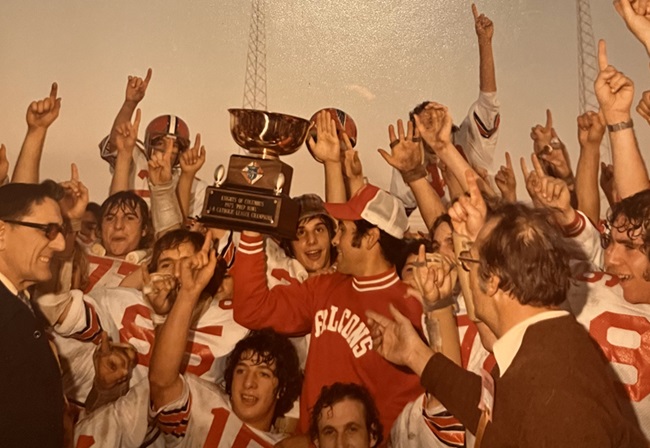 During the regular season, DC earned victories over highly-touted Flint Powers Catholic (20-14), previously unbeaten Southgate Aquinas (26-12) and Allen Park Cabrini (12-8).
During the regular season, DC earned victories over highly-touted Flint Powers Catholic (20-14), previously unbeaten Southgate Aquinas (26-12) and Allen Park Cabrini (12-8).
That set up a Catholic League Prep Bowl showdown in the final game of the regular season against highly-touted 8-0 Birmingham Brother Rice, which was ranked No. 1 in the final regular-season AP Class A poll.
Although the Falcons were a decided underdog, the AA division champs upended Rice, 7-0, before a packed crowd at Eastern Michigan University’s Rynearson Stadium to snap the Warriors’ 22-game winning streak thanks to Jim Kempinski’s fumble return for a seven-yard touchdown as he snagged the ball in mid-air and never broke stride while crossing into the end zone.
“We played our butts off,” Faletti said. “It was a dog-eat-dog game.”
It was DC’s 11th Catholic League title, but more importantly put the Falcons into the first MHSAA Playoffs against Sturgis in a Semifinal match at C.W. Post Field in Battle Creek.
“I remember everything was brand new; nobody knew what they were doing,” said Wishart, who guided the Falcons to the 1985 Class A crown as their head coach. “Coach LaPointe on Monday had to get the school to get our hotel rooms in Battle Creek.”
Steve Toepper booted a 27-yard field goal for Sturgis to open the scoring, but DC responded with 20 unanswered points.
In the final quarter, DC’s Rick Rogowski scored on a seven-yard run with 9:23 left (after Steve Savini recovered a fumble caused by Joe Wiercioch) followed by a 10-yard TD run by Faletti with only six minutes to go (after Svihra recovered a fumble).
That sent the Falcons into the Final at CMU, where their defense suffocated MacArthur (9-2).
“We kind of ran a special outside zone. We had to quickly change (how) we would defend that. We shut them down,” said Wishart, who spent 50 years in CYO and high school coaching before retiring to live in New York. “There was no doubt, we were more physical than they were. We were blue collar kids. Typical Divine Child kids, hard-working, never give up.
“We believed desperately in defending Divine Child at all costs because we were a smaller school, so we had an attitude that still lingers there today that we all cultivated. We were going to be a physical squad.”
Meanwhile, what made the Falcons special and unique that title season was their “one for all and all for one” attitude.
“Everybody was the same,” Faletti said. “When we went between the lines, we were all equal. As captain, I got to be command as quarterback in the huddle. But off the field we were all equal. We played like 22 seniors. We were ready for this game.”
PHOTOS (Top) Dearborn Divine Child coaches and players receive the Class B championship trophy after winning the inaugural title game in 1975. (Middle) Falcons quarterback Dan Faletti throws a pass during the Final. (Below) Divine Child players and coaches raise their Prep Bowl trophy in celebration. (Championship game photos courtesy of Dearborn Divine Child yearbook. Prep Bowl photo provided by Dan Faletti.)

